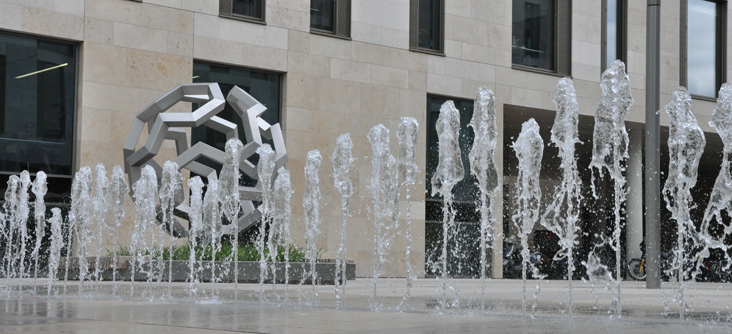
Highlights and Success Stories
Between January 2015 and May 2022, the total number of original research papers of all IWR members lies slightly above 2500 according to the most recent poll among the IWR members. This research is largely driven by our graduate students, and an impressing number of 295 have successfully defended their PhD thesis within the last seven years and received their PhD at IWR. The developed mathematical tools are collected in software packages, which are disseminated into the scientific community, usually for free. More details can be found in the description of the main research field Numerical Algorithms and Software.
IWR has also been very successful in attracting collaborative research programs. Two Carl-Zeiss Centers are currently located at IWR: “Model-Based AI: Physical Models and Deep Learning for Imaging and Cancer Treatment” and “Scientific Computing: Sustainable Software Collaboratory (SCSC)”. One European Training Network on “Computational Spectroscopy in the Natural Sciences and Engineering” and the collaborative research network “Scientific Computing for the Improved Diagnosis And Therapy Of Sepsis” funded by the Klaus Tschira Stiftung (KTS) have been acquired, and are coordinated and driven by IWR members.
Humboldt-Professor Joacim Rocklöv
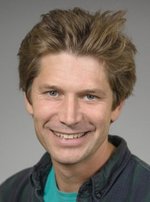
In a concerted effort, IWR together with the Heidelberg Institute for Global Health (HIGH) managed to receive a prestigious Humboldt-Professorship for Prof. Joacim Rocklöv for “Artificial Intelligence in the Researching of Climate-sensitive infectious Diseases”. Epidemiologist, mathematician and statistician Joacim Rocklöv has, since 2018, had a professorship at the Department of Public Health and Clinical Medicine at Umeå University, at which he was formerly a senior lecturer and then associate professor. In 2019, for his research on environment-related arbo-virus epidemics, Prof. Rocklöv was awarded the “Prince Albert II of Monaco – Institut Pasteur” prize. The Humboldt Professorship is designed as a bridge professorship between HIGH and IWR. His research emphasis will be on how to use methods of artificial intelligence (AI), particularly machine learning, and of data science in order to gain a new understanding of the spread of infectious diseases and possibilities of intervention. Particular attention will go to the influence of changing climatic conditions. The aim is to highlight the impacts of climatic and environmental changes on public health, develop predictive models as early warning systems and come up with possible forms of intervention to counter the spread of climate-sensitive diseases.
ERC Grants
IWR members are also very successful in acquiring ERC grants. During the reporting period, ten ERC grants were held by IWR members. The most recent four have been grant- ed during the last two years to Anna Wienhard, Frauke Gräter, Ganna Gryn’ova and Ralf Klessen.
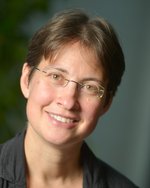
Prof. Anna Wienhard received an ERC Advanced Grant “PosLieRep – Positivity in Lie Groups and Representation Varieties”. The project builds on a previous ERC Consolidator grant and focuses on Lie groups, which play a central role in many fields of mathematics and are an important tool in theoretical physics. Lie groups describe the symmetries of a space or a system. It has many applications in discrete mathematics, in the theory of stochastic processes and in representation theory. Prof. Wienhard has discovered new positivity structures that generalise the total positivity in Lie groups, and the PosLieRep project is to study these new structures and to gain new insights in the theory of higher Teichmüller spaces. At the same time, this field of re- search opens up interesting new perspectives on further areas, for instance super-symmetrical field theories in physics.
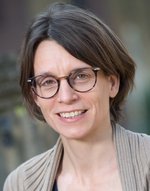
Prof. Frauke Gräter received an ERC Consolidator Grant “RADICOL – Mechanoradicals in Collagen”. Her research group at HITS and IWR uses methods of high-performance computing and simulation techniques to investigate how mechanical forces influence the inner processes of living organisms. Proteins are a particular focus. In her ERC project, “Mechanoradicals in Collagen” (RADICOL), Prof. Gräter and her team are looking at the impact of mechanical loads on collagen, which is the main component of our connective tissue. In particular, they are investigating whether, and how, highly reactive radicals originate in the collagen of, e. g., the Achilles tendon and damage the tissue. The results may supply important leads for our understanding of aging and pain.
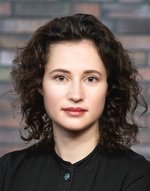
Dr. Ganna Gryn’ova received an ERC Starting Grant “PATTERNCHEM” to investigate novel functional organic ma- terials. To explore and advance these promising materials, she uses state-of-the-art methods from computational and theoret- ical chemistry and materials science. So far Ganna Gryn’ova’s “Computational Carbon Chemistry” group at HITS and IWR have laid the foundations for accurate and efficient simulations of two-dimensional organic materials and their interactions with small molecular targets. Building on that, she will use the ERC grant to evaluate the topological fingerprints of promising mate- rials such as graphene derivatives, covalent organic frameworks and hyperbranched polymers. In this way, she aims to open up new ways of optimising organic functional materials for diverse scientific and industrial applications, e.g., for “green” catalysis or pharmacotherapy.
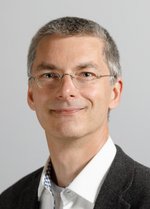
Prof. Ralf Klessen received an ERC Synergy Grant “ECOGAL – Understanding our Galactic Ecosystem: From the Disk of the Milky Way to the Formation Sites of Stars and Planets” as part of an international research team from Germany, France, and Italy, who are collaborating to develop an understanding of the Milky Way as a complex “galactic ecosystem”. Building on the comprehensive observation of various physical scales, the re- searchers aim at developing a unifying predictive model for the formation of stars and planets in our home galaxy. The funds will also be used to develop astronomical instruments as well as participate in large-scale projects to systematically survey stars and galactic molecular clouds.
Initial Appointments of Researchers from the IWR
Another marker for the success of the research groups at the IWR and the quality of the promoted scientific education is the success of our young academics. Within the last seven years (2015 - 2022) a large number of our young academics were appointed to professorships at various universities in Germany or abroad. This remarkable rate certifies the high qualification of the graduates of the IWR.
- Apl. Prof. Dr. Sven Lautenbach • Extraordinary Professorship, Heidelberg University (DE) • 2022
- Prof. Dr. Filip Sadlo • Full Professorship (W3/Tenure Track), Heidelberg University (DE) • 2021
- Dr. Andreas Rupp • Assistant Professorship (W3/Tenure Track), LUT University (FI) • 2021
- Dr. Nils Reiter • Full Professorship (W3/Tenure Track), University of Cologne (DE) • 2021
- Dr. Tessio Novack • Assistant Professorship, University of Warwick (UK) • 2021
- Dr. Debashish Mukherji • Assistant Professorship (Tenure Track), University of British Columbia (CA) • 2021
- Dr. Vedran Miletić • Assistant Professorship, University of Rijeka (HR) • 2021
- Dr. Hubert Mara Full • Professorship (W3/Tenure Track), University of Halle (DE) • 2021
- Dr. Melih Kandemir • Associate Professorship, University of Southern Denmark (DK) • 2021
- Dr. Dennis Janka • Full Professorship (W3/Tenure Track), University of Applied Sciences Karlsruhe (DE) • 2021
- Dr. Gabriele Benedetti • Assistant Professorship (Tenure Track), VU Amsterdam (NL) • 2021
- Dr. Michael Wiegand • Full Professorship (W3/Tenure Track), University of Klagenfurt (AT) • 2020
- Dr. Frits Veerman • Assistant Professorship, University of Leiden (NL) • 2020
- Dr. Thomas Stiehl • Assistant Professorship, Aachen University (DE) • 2020
- Dr. Bernhard Renard • Full Professorship (W3), University of Potsdam (DE) • 2020
- Dr. Andreas Potschka • Full Professorship (W3/Tenure Track), Clausthal University of Technology (DE) • 2020
- Dr. Tristan Bereau • Assistant Professorship (Tenure Track), University of Amsterdam (NL) • 2020
- Dr. Björn Andres • Full Professorship (W3), Technische Universität Dresden (DE) • 2020
- Dr. Peter Zaspel • Assistant Professorship (W3/Tenure Track), Jacobs University Bremen (DE) • 2019
- Dr. René Westerholt • Jun. Professorship, Dortmund University (DE) • 2019
- Dr. Manjesh Singh • Assistant Professorship (Tenure Track), IIT Kanpur (IN) • 2019
- Dr. Nikolaos Sfakianakis • Lecturer, University of St. Andrews (UK) • 2019
- Dr. Anni Samuele • Assistant Professorship, Aix Marseille Université (FR) • 2019
- Dr. Tim Neudecker • Jun. Professorship (Tenure Track), University of Bremen (DE) • 2019
- Dr. Franz-B. Mocnik • Assistant Professorship, University of Twente (NL) • 2019
- Dr. Davide Marcadante • Associate Professorship, University of Auckland (NZ) • 2019
- Dr. Yong Hu • Associate Professorship (W3/Tenure Track), Sichuan University (CN) • 2019
- Dr. Yair Grinberger • Lecturer, Hebrew University of Jerusalem (IL) • 2019
- Dr. Joscha Gedicke • Full Professorship (W3/Tenure Track), University of Bonn (DE) • 2019
- Dr. Xinguang Cui • Full Professorship (W3/Tenure Track), Huazhong University of Science and Technology (CN) • 2019
- Dr. Thomas Carraro • Professorship (W2), Helmut Schmidt University, Hamburg (DE) • 2019
- Dr. Maria Barbarossa • Jun. Professorship, Frankfurt Institute for Advanced Studies (DE) • 2019
- Dr. Chong Yang • Assistant Professorship, Shandong University (CN) • 2018
- Dr. Yingwei Yan Lecturer • National University of Singapore (SG) • 2018
- Dr. Martin Storath • Full Professorship (W3/Tenure Track), University of Applied Sciences Würzburg-Schweinfurt (DE) • 2018
- Dr. Manish Sreenivasa • Lecturer, University of Wollongong (AU) • 2018
- Dr. Raffaello Potestio • Associate Professorship (Tenure Track), University of Trento (IT) • 2018
- Dr. Pascal Neis • Full Professorship (W3/Tenure Track), University of Applied Sciences Würzburg-Schweinfurt (DE) • 2018
- Dr. Christian Kücherer • Full Professorship (W3/Tenure Track), Reutlingen University (DE) • 2018
- Prof. Dr. Wei Huang • Full Professorship (W3/Tenure Track), Tongji University (CN) • 2018
- Dr. Bernhard Höfle • Full Professorship (W3/Tenure Track), Heidelberg University (DE) • 2018
- Dr. Elfriede Friedmann • Professorship (W2), University of Kassel (DE) • 2018
- Dr. Debora Clever • Guest Professorship, Technical University of Darmstadt (DE) • 2018
- Dr. Shinpei Baba • Associate Professorship, Osaka University (JP) • 2018
- Dr. Christian Kirches • Full Professorship (W3/Tenure Track), TU Braunschweig (DE) • 2017
- Dr. Shirin Faraji • Associate Professorship, University of Groningen (NL) • 2017
- Dr. Hongchao Fan • Full Professorship (W3/Tenure Track), Norwegian University of Science and Technology (NO) • 2017
- Dr. Peter Bell • Full Professorship (W3/Tenure Track), Friedrich-Alexander-Universität Erlangen-Nürnberg (DE) • 2017
- Dr. Alexis Palmer • Assistant Professorship, University of North Texas (US) • 2016
- Dr. Wenjin Li • Assistant Professorship, Shenzhen University (CN) • 2016
- Dr. Stefan Körkel • Full Professorship (W3/Tenure Track), OTH Regensburg (DE) • 2016
- Dr. Lena Daumann • Professorship (W2), Ludwig-Maximilians-Universiät, Munich (DE) • 2016
- Dr. Udo Birk • Full Professorship (W3/Tenure Track), University of Applied Sciences of the Grisons, Chur (CH) • 2016
- Dr. Jamal Jokar Arsanjani • Associate Professorship, Aalborg University (DK) • 2016
- Dr. Günther Sagl • Full Professorship (W3/Tenure Track), University of Applied Sciences Kärnten (AU) • 2015
- Dr. Bernd Resch • Associate Professorship, Paris Lodron University of Salzburg (AU) • 2015
- Dr. Hernán Andres Olguín Astudillo • Full Professorship (W3/Tenure Track), Universidad Técnica Federico Santa Maria, Valparaiso (CL) • 2015
- Dr. Stefania Petra • Assistant Professorship, Heidelberg University (DE) • 2015
- Dr. Matthias Maier • Assistant Professorship, University of Minnesota (US) • 2015
- Dr. Agnieszka Bronowska • Lecturer, Newcastle University (UK) • 2015